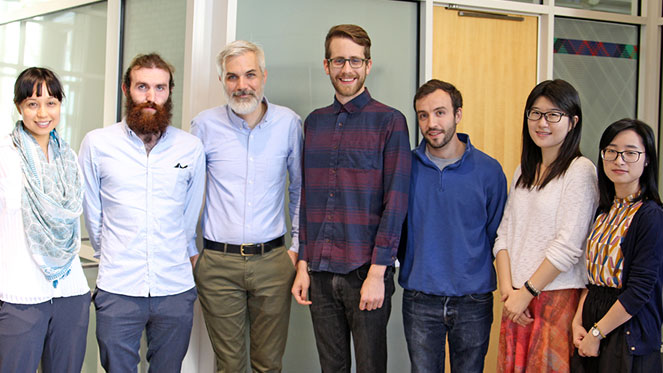
Seven Andrew W. Mellon Fellows Selected
By Emily Stimmel
Carnegie Mellon University’s Dietrich College of Humanities and Social Sciences has selected seven Andrew W. Mellon Fellows. The Ph.D. students are preparing to start ambitious projects that blend research from the English, History, Modern Languages and Philosophy Departments with cutting-edge technology to create new applications for humanities work.
“Our graduate students are coming up with novel research projects in digital humanities and promising concepts for enriching classroom learning,” said Andy Norman, special faculty in the Department of Philosophy and project manager for the fellowship. “Now, they have the support they need – and we expect great things from them.”
That support comes from the Andrew W. Mellon Foundation, which awarded a five-year, $2 million grant to CMU in 2014 to transform humanities graduate research and increase learning through digital technology. With its strengths in pioneering technology-enhanced learning (TEL) and its university-wide commitment to using TEL to improve student learning outcomes through the Simon Initiative, CMU is well-positioned to meet these goals.
Digital humanities fellows will incorporate everything from game theory simulations to visual maps of social movements in their projects, while TEL fellows will explore new approaches to teaching language and constructing arguments.
“Last year’s fellows learned and applied technical skills like network analysis and digital mapping and presented their work internationally,” said Scott Weingart, digital humanities specialist. “I’m excited to see how the 2017 cohort will integrate even more diverse techniques into their research.”
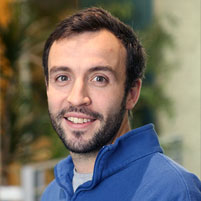 David Busch, History
David Busch, History
History Department
Busch is examining the links between social movements and American higher education in the 1960s. He plans to create a digital map with biographical data about the Student Nonviolent Coordinating Committee (SNCC) field workers and student volunteers who participated in the 1964 Mississippi Freedom Summer – a defining moment in the civil rights movement. This interactive digital mapping tool will visually demonstrate key connections between Freedom Summer activists and later participants in anti-war, women’s rights and university reform protests.
The fellowship will fund a course on D3.js Javascript software, further research on Freedom Summer and travel to the 2017 Digital Humanities Summer Institute (DHSI) in Victoria, B.C.
Busch looks forward to meeting and collaborating with the other fellows, learning about their projects and engaging in interdisciplinary conversations about the digital humanities.
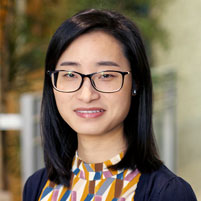 Qiong Li, Second Language Acquisition
Qiong Li, Second Language Acquisition
Modern Languages Department
Second-language (L2) learning is not limited to grasping grammar and vocabulary; it also requires pragmatic competence – an understanding of usage in appropriate contexts. Li seeks to fill a gap in the current research about teaching pragmatic competence to L2 learners with the assistance of computer-mediated communication (CMC) tools.
For her TEL project, Li will pair L2 learners with native Chinese speakers via Skype and computerize data from these interactions using Revolution software. She will then build a small collection of texts—a corpus—that she will use to trace the development of pragmatic competence, with assistance from the University of Pittsburgh’s Na-Rae Han.
Li will also work with CMU digital humanities and TEL experts, including Weingart; Naoko Taguchi, associate professor of Japanese and second language acquisition; and Marsha Lovett, director of the Eberly Center for Teaching Excellence & Educational Innovation, co-coordinator of the Simon Initiative and teaching professor of psychology.
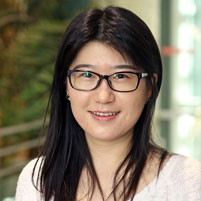 Tianyu (Sophie) Qin, Second Language Acquisition
Tianyu (Sophie) Qin, Second Language Acquisition
Modern Languages Department
Qin is investigating the ways that L2 Chinese learners respond during a computerized dynamic assessment (C-DA) that evaluates their comprehension of indirect speech acts. For instance, if a friend says, “I have a lot of work to catch up on,” the statement may be literal or may be an indirect refusal of an invitation. For L2 learners, the indirect meaning is more difficult to understand.
She will use ScreenFlow software to record subjects as they take the C-DA test. By recording learners’ speech, gestures and facial expressions, Qin will capture important data about test performance and the learners’ response processes.
Throughout the fellowship, Qin plans to explore similar tools, like LiveCode, that may impact her project design. She looks forward to participating in reading groups and workshops with other digital humanities fellows and plans to take the discourse analysis course offered by Barbara Johnstone, professor of English and linguistics.
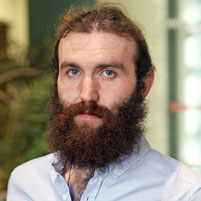 Connor Robinson-Arnull, Logic, Computation & Methodology
Connor Robinson-Arnull, Logic, Computation & Methodology
Philosophy Department
Robinson-Arnull is exploring the development of moral language among humans using evolutionary game theory – the mathematical study of strategic interactions over time.
The human capacity to label others or their actions as “good” or “bad” is thought to help promote ethical behaviors like sharing resources. Robinson-Arnull is interested in modeling the evolution of this use of language and its role in human communities. These models can then be simulated computationally to demonstrate how moral language influences the behavior of groups over time.
He expects to benefit from working with other digital humanities fellows from a variety of disciplines, but particularly in the English and Modern Languages Departments. The time and resources provided by the fellowship will allow him to scale current simulations so he can add further complexity to game-theoretic models.
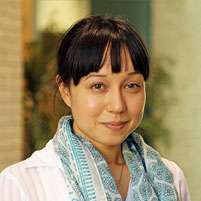 Aurora Tsai, Second-Language Acquisition
Aurora Tsai, Second-Language Acquisition
Modern Languages Department
Through her TEL project, Tsai is investigating ways to support “reading to learn” skills in a Japanese foreign language classroom. Reading to learn helps students comprehend texts and connect that information with prior knowledge to convey new understanding of a topic. For example, students might read about feminism in Japan, compare it with feminism in the U.S. and express their refined knowledge in an essay.
She will explore technology, which may include the Django web framework and Python, to help students identify and correct gaps in their understanding.
Tsai looks forward to sharing progress with other TEL fellows and learning from their research to develop a computer-mediated reading-to-learn module that will become part of her dissertation research.
The fellowship will allow her to observe foreign language classes and gain insight from TEL specialists like Sébastien Dubreil, teaching professor of French and Francophone Studies, second language acquisition and technology-enhanced learning.
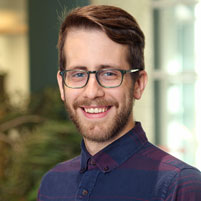 Patrick Walsh, Logic, Computation and Methodology
Patrick Walsh, Logic, Computation and Methodology
Philosophy Department
Walsh is designing a long-term group TEL project for the Open Learning Initiative (OLI) course, “Undecidability and Incompleteness,” taught by Wilfried Sieg, the Patrick Suppes Professor of Philosophy.
The redesigned course will give students an opportunity to engage more deeply with the material by leveraging a software environment that encourages exploration.
Specifically, the project will require students to construct arguments that make use of concepts and techniques they learned in the lecture and OLI text. The goal is for students to recognize deep analogies between examples given in class and an example they will work through for the group project.
For Walsh, the most exciting aspect of the fellowship is that it allows him to devote the necessary time during the semester for designing—and refining—the course so he can focus on implementation and design.
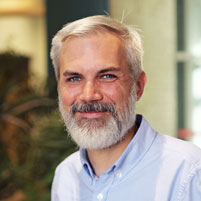 Avery Wiscomb, Literary and Cultural Studies
Avery Wiscomb, Literary and Cultural Studies
English Department
For his digital humanities project, “The Long Bloom: Science and Technology Culture in the U.S. (1966-1981),” Wiscomb will draw from a large dataset of media highlighting the relationships between post-World War II computer research and the 1960s countercultural revolution.
He will use this data to visually map cultural and ideological conflicts related to science and technological advancements in the U.S. during the mid-twentieth century. Wiscomb hopes to make connections between dominant cultural views of the time period, underlying beliefs about the future and ideas about achieving a post-human utopia within digital cultures – for example, merging with machines or living forever inside computers.
Wiscomb is excited to work with Weingart and Digital Humanities Developer Dan Evans, other fellows and Hunt Library research specialists. He will focus his time during the fellowship on trainings in data visualization and dynamic network analysis and will also attend the DHSI.
For more information on the strength of Carnegie Mellon’s humanities, visit Dietrich College Humanities.